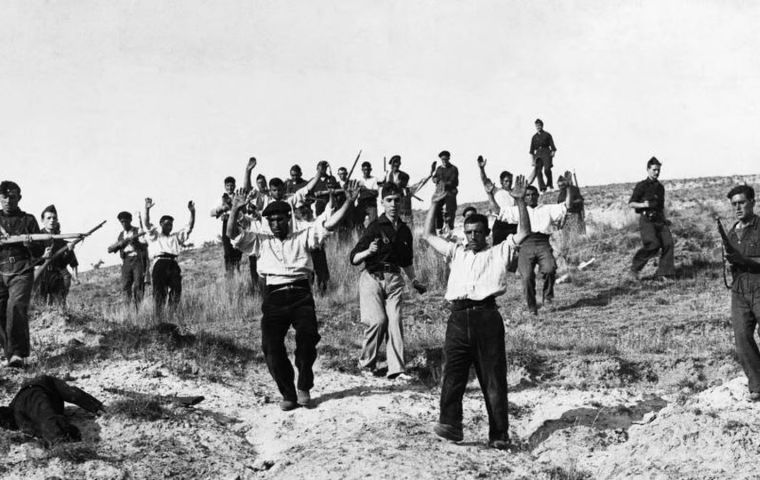MercoPress. South Atlantic News Agency
Spain exhuming Civil War remains and returning them to their families towns
 The law, one of the first to be passed by Socialist PM Pedro Sánchez, aims to make reparations to the families of Franco's victims and modernize the narrative
The law, one of the first to be passed by Socialist PM Pedro Sánchez, aims to make reparations to the families of Franco's victims and modernize the narrative A team of experts in Spain has begun work to exhume the bodies of more than 100 civil war victims from a huge basilica complex near Madrid, where dictator Francisco Franco once lay.
The 15-strong team of forensic experts, archeologists, scientific police and odontologists will search for some 128 victims of General Franco's forces during the 1936-39 civil war conflict, whose bodies were moved to the site anonymously and whose families have requested they be identified and returned to them for proper burial under Spain's so-called “democratic memory” law.
The law, one of the first to be passed by Socialist Prime Minister Pedro Sánchez, aims to make reparations to the families of Franco's victims and modernize the narrative around the dictatorship in Spain.
But with Sanchez facing an uphill battle for reelection in an early general election on 23 July, the exhumations have become a political issue.
The right-wing opposition Popular Party (PP) has vowed to repeal the law if they come to power, claiming it needlessly dregs up the past.
“This is not about politics, it is simply a matter of pure humanity,” insisted the democratic memory ministry in a statement, saying the aim is to “try to recover those bodies and deliver them to their families to give them a dignified burial.”
Government spokeswoman Isabel Rodríguez told Spanish National Television TVE: “Finally, and perhaps too long overdue, Spanish democracy is providing an answer to these victims.”
The basilica at the Valley of Cuelgamuros, situated 50 kilometers northwest of Madrid and marked by a 150-meter stone cross, is the resting place of some 33,000 deceased from both sides of the civil war. It was built with forced labor to commemorate Franco's victory in the civil war.
While the grandiose site is ostensibly dedicated to the memory of all victims, the only graves that were marked were those of Franco and of Jose Antonio Primo de Rivera, founder of Spain's Falange party, making the area an attractive location for far-right extremists.
The bodies of both Franco and Primo de Rivera were removed in 2019 and April this year respectively. Now, the families of 128 other anonymous victims, whose bodies were moved to what was formerly known as the Valley of the Fallen from cemeteries across the country, want their loved ones to be returned, too.
A special laboratory has been set up within the mountainside mausoleum to help match corpses with the DNA of surviving relatives, as experts do have some indications as the approximate locations within the crypt of the wooden coffins they are looking for.
Results of the exhumations aren't expected until after the election, but the subject is still likely to make the legacy of the civil war and Spain's tragic past a topic of discussion in the build-up to the vote.




Top Comments
Disclaimer & comment rulesCommenting for this story is now closed.
If you have a Facebook account, become a fan and comment on our Facebook Page!